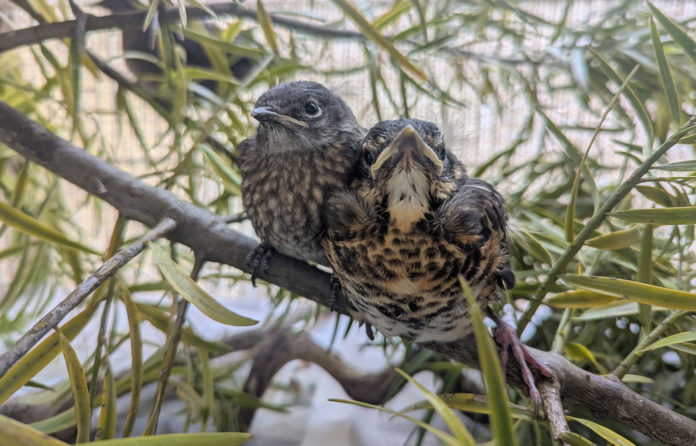
MONTEREY COUNTY — SPCA Wildlife Rescue and Rehabilitation Center in Monterey County is celebrating a heartwarming story of friendship and care among its newest arrivals.
Recently, the center took in two orphaned baby birds — a Western Bluebird and an American Robin — who, despite their differences, have become inseparable companions during their time in rehabilitation.
Typically, the Wildlife Center raises nestlings with their own species to help them learn vital social skills needed for survival. However, due to the circumstances, these two young birds — rescued alone — are being raised together to provide mutual comfort and companionship until they’re ready to be released back into the wild.
“These two look like a perfect pair, and they are! They just aren’t the same, and that’s OK,” explained SPCA Monterey County in a news release July 22. “… These birds of a feather are like two peas in a pod who go together like peanut butter and jelly in our care, but once they are released, they will likely go their separate ways.”
Currently, the center is caring for a record-breaking 184 wild animals, including a diverse array of injured and orphaned wildlife. With so many patients, staff and volunteers work tirelessly, especially caring for the baby birds, which require feeding as often as every 20 minutes from 7 a.m. to 7 p.m. — adding up to over 200 feedings daily.
The SPCA Wildlife Center is the only full-service wildlife rescue and rehabilitation center in Monterey County. It operates independently, relying heavily on community support.
The organization encourages community members to help by donating at spcamc.org/donate, purchasing gifts through their Amazon wishlist at SPCAmc.org/baby-shower and donating empty glass baby food jars to aid in feeding efforts. In addition, donations of eggs and mealworms are welcomed, as they provide essential protein for recovering animals and fragile young birds.
The center also emphasized the importance of respecting wildlife: “Learn when an animal needs to be rescued and when it is safe in the wild,” urging the public to visit spcamc.org/blog for guidance.














